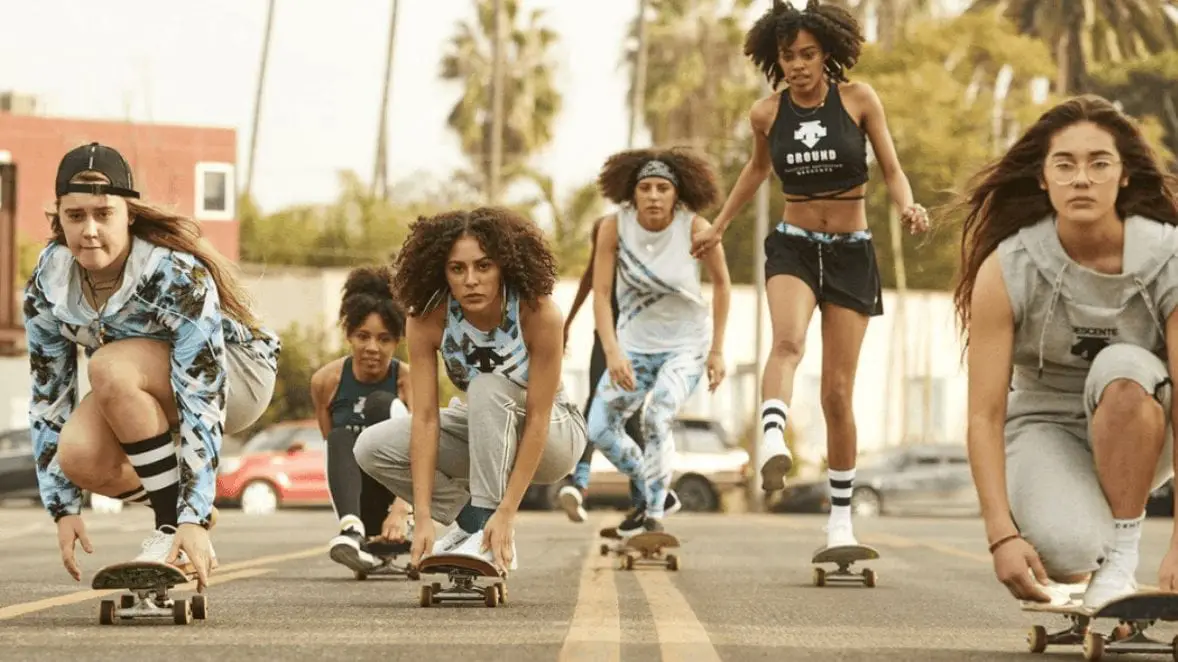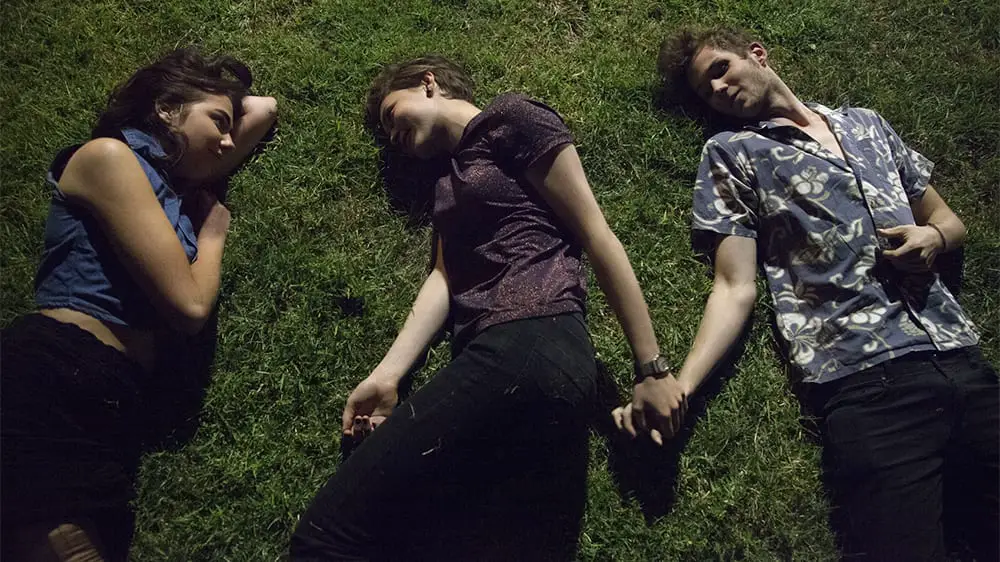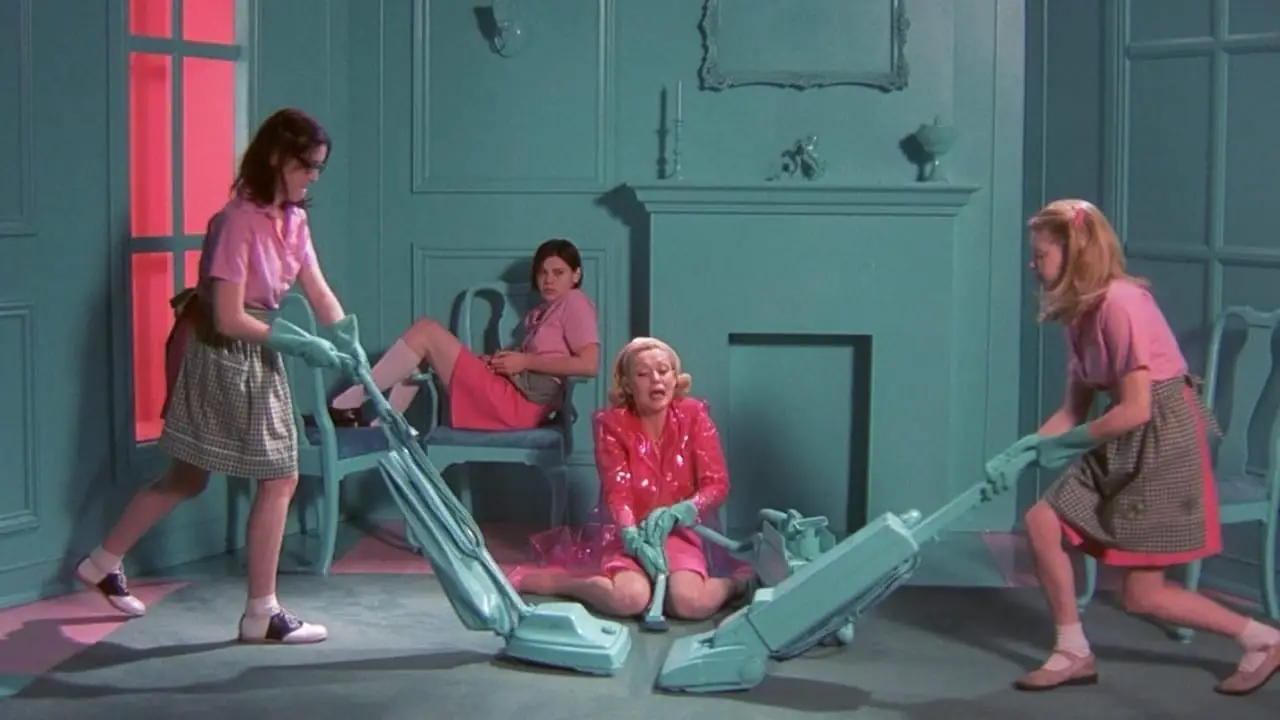Skate Kitchen
A raw and stunningly immersive coming of age movie, Skate Kitchen combines the milieu of Larry Clark’s Kids with an infinitely more mature and empathetic understanding of adolescence and sexuality. Its touching and lyrical tone would make it a superb companion piece with Céline Sciamma’s Bande des filles or Jonah Hill’s Mid90s, a pairing which, thanks to its blissful and intimate style, Skate Kitchen would come out of ahead.
The film has a naturalistic warmth and realistic approach to its subject, achieved through close collaboration with the young leads, who were allowed to mould the parts to their own instincts, so that each and every character feels 100% natural and believable. The chemistry of the young cast was so phenomenal that the film was commissioned for a TV series with HBO, now in line for a second series. The film follows Camille, a lonely teenager with parental issues, who discovers herself and a new troupe of allies in the teens at the local skate park.

Through this loose narrative Skate Kitchen explores adolescent friendships, bonding and sexuality in a complex and nuanced way, yet it never feels as if there’s a guiding hand pushing the characters to their destinations. Their loose interactions grow these issues organically, luring the viewer into each of the transcendentally beautiful and effective moments in its story. I’ve never liked Khalid’s music, but sometimes you hear an artist in a different context and their vibe just clicks, and hearing “Young Dumb and Broke” in a key moment in this made me a fan right away. Speaking of young musicians, Jaden Smith turns up here, and although he’s the one actor whose performance felt a little off, he brought the requisite presence and character to the role.
The only issues I had were minor. The tension between Camille and her mother was never properly explained, and I get it, the scene where she talks to one of her friends about it is wonderfully understated, but since she’s the point of view character, shouldn’t we know that stuff? The other was just a pacing issue. For the majority of the film, it just floats along on a cloud of adolescent euphoria, which is 100% what makes it such captivating viewing. However, the wrap up in the last third just felt very abrupt. I would have liked to have seen the events the film chose to omit. As I said though, those are minor reservations. I loved this film, and might even watch that TV show, “Betty” just to spend more time with these characters I grew to love so much during this film, and I almost never watch any TV.
Pride
Perhaps the most mainstream film on this list, it was of films like Pride that I earlier suggested there was some discontinuity between films with Queer characters and Queer cinema. Pride engages with its themes from a distinctly mainstream perspective, framing the Queer movement of the 1980s through the perspective of the kind of feel-good underdog story that has been Britain’s leading cinematic export. There is a definite shallowness in the film’s portrayal of its themes and history, with the nostalgic setting lending its themes a sense of mollified distance. However, there are some aspects to the story that more than make up for its formulaic handling of its subject, which alone was too much for American distributors whose promotional materials excised the Queer content.

The film follows two different groups of activists, each fighting for their rights, one a Welsh mining community on strike for their livelihoods, the other a group of lesbian and gay activists, who decide to begin fundraising for their Welsh brothers and sisters. Initially unsure of how to help one another, the two groups soon learn to overcome their outward differences and unite against a common enemy in the right-wing government. The story is largely told from the perspective of Bromley (George MacKay) a new recruit to the struggle, becoming politicised in tandem with the discovery of his sexuality. Stage director Matthew Warchus maintains an accessible but emotionally articulate grasp on the material, equally funny and moving, and uplifting without feeling saccharine or infantilising. The performances from the ensemble cast including Bill Nighy, Andrew Scott, Dominic West, Paddy Considine, Ben Schnetzer and Imedla Staunton are uniformly terrific, though the film principally deserves credit for possibly my favourite coming out scene in cinema, a beautifully mundane and brilliantly understated moment.
52 Tuesdays
Whenever a high profile trans role arises (which it rarely does) and then invariably goes to a cis actor, the difficulty raised with casting such roles (often to justify casting a cis actor) is that often these narratives involve playing the character both before and after transitioning. Finding actors to play the same character at both points is a challenge to casting directors and even more so to any actor, trans or not. One of the few films to achieve the feat though was 52 Tuesdays, shot and set over the course of a year, following bisexual teenager Billie (Tilda Cobham-Hervey) as she undergoes her own journey of sexual self-discovery, while processing her fractious relationship with her parent James (Del Herbert-Jane) as he undergoes hormone therapy. James is having a difficult transition and needs space and time to himself, sending Billie to go live with her other parent Tom (Beau Travis Williams), which Billie internalises as a rejection.
The film contrasts both characters’ journeys beautifully, with the real time filming strategy allowing the story to catalogue both James and non-professional actor Herbert-Jane’s transitions, lending the film an unparalleled sense of credibility and authenticity. It’s an extraordinary feat by editor Bryan Mason and the central performances by Herbert-Jane and Cobham-Hervey, both making their screen debuts, are fantastically real, vivid and intimate. Director Sophie Hyde has since gone on to do equally magnificent work with films like Animals, and her fantastically lucid and empathic approach to her subject brings the film to such visceral life.

The tragedy of the scenario is that of the parent and child struggling against each other and themselves, rather than exterior social factors as is the norm for many Queer stories. James urgently needs some space and support while Billie feels confused, rejected and starved for attention, James is trying to become her father while Billie wants to keep her mother. Both feel the need to preserve their relationship throughout this difficult time but neither is sure how best to protect it or when to call upon it. As the parent tries desperately to self-actualise, the child is struggling to self-discover and their desires to express themselves are continually confounded. 52 Tuesdays is without a doubt one of the most unique, intimate and certainly underseen films of recent years.
But I’m a Cheerleader
Conversion therapy (the homophobic institutional practice of brainwashing young queer people into conforming to socially constructed ideal of heteronormativity) is a complex issue to deal with through art. It’s both absolutely horrifying and detestable, and yet completely ridiculous, and both of those things so fundamentally and blatantly, that finding the right register is difficult. It can sometimes feel exhausting explaining incredibly basic human rights to people as if they were children, and yet that doesn’t make it any less necessary.
Films have attempted to portray these horrendous institutions across a range of themes and styles, from the wholly dramatic and serious with Boy Erased, through something of a mix of comedy and drama with The Miseducation of Cameron Post (in my opinion the best and most complete film on the topic) all the way to the almost absurdist But I’m a Cheerleader, a film which ridicules the institution and its foundational ideologies as thoroughly as they deserve.
The film follows Megan, a naive high-schooler whose parents divine is gay and is sent to spend the summer in a pastel-pink and blue conversion camp, which ironically constitutes her first actual exposure to other queer people. In this setting she sexually comes of age with her new queer friends, against a backdrop of preposterous cartoon bigotry and narrow-mindedness.

The film handles it’s style and humour far, far better than something like Election – which just felt generically 90s indie quirky – with a sort of borderline surreal exaggeration to some elements, while others are played with a sincere tenderness. Sort of like Wes Anderson or Tim Burton, but not trying nearly so hard or as afraid to be genuine from time to time, maybe Taika Waititi would be a good comparison, although I think this is far better than any Taika Waititi movie yet, it handles is tone far, far better.
The performances are great across the board, from Natasha Lyonne as Megan and Clea DuVall especially – although if you’re watching as a fan of Michelle Williams she’s hardly in it, unfortunately. The ending is a little abrupt – feeling almost like it’s own alternate ending or they got to that scene with only one day of shooting left – but aside from that I don’t really have any complaints, it’s a very humane, witty coming of age romance. Short and very, very sweet.



